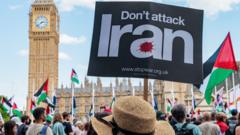Will the UK Be Drawn Into This Conflict?

Is History Repeating Itself in the Middle East? Examining the UK's Role in Potential US-Iran Conflict
The echoes of 2003 are resonating once more in the geopolitical landscape of the Middle East. In that year, Britain joined the United States in a contentious military campaign against Iraq, driven by the belief that the nation harbored weapons of mass destruction. This assumption was later proven false, as those weapons had been dismantled prior to the invasion. Today, as tensions escalate between Israel and Iran, many are left wondering whether the UK will again find itself embroiled in a military conflict, and if so, what role it might play.
With the potential for a new military conflict on the horizon, especially if former President Donald Trump decides to commit US forces to support Israel's efforts against Iran's nuclear program, Britain’s involvement is uncertain yet inevitable. This article will explore the implications of current events, the UK's strategic assets in the region, and what the future might hold for British foreign policy.
The Current Landscape: A Fragile Middle East
The Middle East remains a volatile region, marked by longstanding rivalries and conflicts. The current tension primarily revolves around Iran's nuclear ambitions, which Israel perceives as a direct threat to its national security. As the UK and its G7 allies call for de-escalation, Israel appears determined to take military action. This situation is further complicated by the recent deterioration of UK-Israel relations, particularly after the UK joined other Western nations in sanctioning Israeli officials for violence against Palestinians.
The Role of Diplomacy
Despite being sidelined in military considerations, the UK still possesses a critical diplomatic role. Foreign Secretary David Lammy's meetings in Washington and subsequent discussions in Geneva with France and Germany highlight Britain's commitment to engaging in dialogue regarding Iran’s nuclear program. The Joint Comprehensive Plan of Action (JCPOA), established in 2015, aimed to curb Iran's nuclear capabilities through inspections in exchange for sanctions relief. However, the US withdrawal from this agreement in 2018 has left a vacuum that the UK and its allies are now striving to fill.
Strategic Military Assets of the UK
While Britain may not be at the forefront of military operations, it maintains several strategic assets that could impact the dynamics of the region significantly. These assets include military bases and installations that may play a role in any potential conflict involving Iran.
Diego Garcia: A Key Strategic Base
Diego Garcia, a remote island base in the Indian Ocean, holds considerable strategic importance. Jointly operated by the UK and the US, this base could facilitate air operations against Iran. The island is approximately 2,300 miles from Iran and is capable of hosting the USAF B2 Spirit bombers, known for their ability to carry the Massive Ordnance Penetrator (MOP) bomb—referred to by some as a "mountain-buster." This powerful weapon is considered one of the few capable of penetrating Iran's fortified nuclear facilities.
However, any military operations from Diego Garcia would require UK permission, and legal advisements suggest that Britain's involvement must remain defensive to comply with international law. Notably, while the B2 bombers have an extensive range, their deployment could still necessitate UK cooperation.
Royal Air Force Assets in Cyprus
The UK's presence in the Mediterranean is underscored by its bases in Cyprus, particularly RAF Akrotiri, which is currently home to a contingent of RAF Typhoon jets. These aircraft are engaged in Operation Shader, focusing on combating terrorist threats from groups like ISIS and al-Qaeda in Syria and Iraq. Additionally, the British Army utilizes Cyprus as a base for rapid deployment forces, ready for contingencies in the region. This geographic positioning could enable the UK to respond swiftly to escalating tensions involving Iran.
The Royal Navy's Role
The Royal Navy has historically played a significant role in maintaining maritime security in the Gulf region, particularly through operations to keep the Strait of Hormuz free from mines. This strategic waterway is crucial for global oil supplies, and disruptions could have far-reaching economic consequences. However, the Royal Navy's presence has diminished over the years, raising concerns about its capacity to respond effectively to any crisis involving Iran.
Implications of UK Involvement
If the UK were to authorize military action in coordination with the US, the repercussions could be severe. Iran has made it clear that it would retaliate against any nation it perceives as participating in an attack against its nuclear facilities. This retaliation could include missile strikes targeting British bases, such as RAF Akrotiri, and even threats to UK citizens and interests both in the region and domestically.
Potential Risks and Considerations
The risks associated with military involvement in the Middle East are multifaceted:
- Escalation of Conflict: Military action could lead to a wider conflict, dragging in other nations and destabilizing the region further.
- Domestic Security Concerns: The threat of retaliatory strikes could heighten security risks within the UK, necessitating a vigilant response from domestic intelligence agencies like MI5.
- Public Opinion: The British public remains wary of military interventions in the Middle East, especially given the legacy of past conflicts.
The Future of UK Foreign Policy in the Middle East
As tensions continue to rise, the UK faces a critical juncture in its foreign policy. Balancing military readiness with diplomatic efforts is essential to navigate this complex landscape. The lessons learned from past interventions must inform current strategies to avoid repeating historical mistakes.
Conclusion: A Path Forward
The situation in the Middle East is fluid, and the UK's role remains uncertain. While it may not be a central player in military operations, its strategic assets, diplomatic engagements, and historical relationships will undoubtedly shape the outcomes of ongoing tensions. As the world watches, the UK must tread carefully, weighing the potential consequences of its actions against its aspirations for peace and stability in the region.
FAQs
What is the significance of Diego Garcia in military operations against Iran?
Diego Garcia is strategically located for air operations, allowing the US to deploy B2 bombers capable of carrying powerful munitions, potentially targeting Iran's nuclear facilities.
How does the UK plan to address its relationship with Iran amid rising tensions?
The UK is engaging in diplomatic discussions with France and Germany to revive the JCPOA and promote de-escalation in the region.
What are the risks of UK military involvement in a US-led operation against Iran?
UK military involvement could lead to retaliation from Iran, increased domestic security risks, and potential public backlash against foreign interventions.
As the Middle East stands on the brink of another potential conflict, the question remains: Will the UK adapt its approach to avoid the mistakes of the past, or will it find itself drawn back into a cycle of military engagement? #MiddleEast #UKForeignPolicy #MilitaryStrategy
Published: 2025-06-19 16:42:12 | Category: technology



